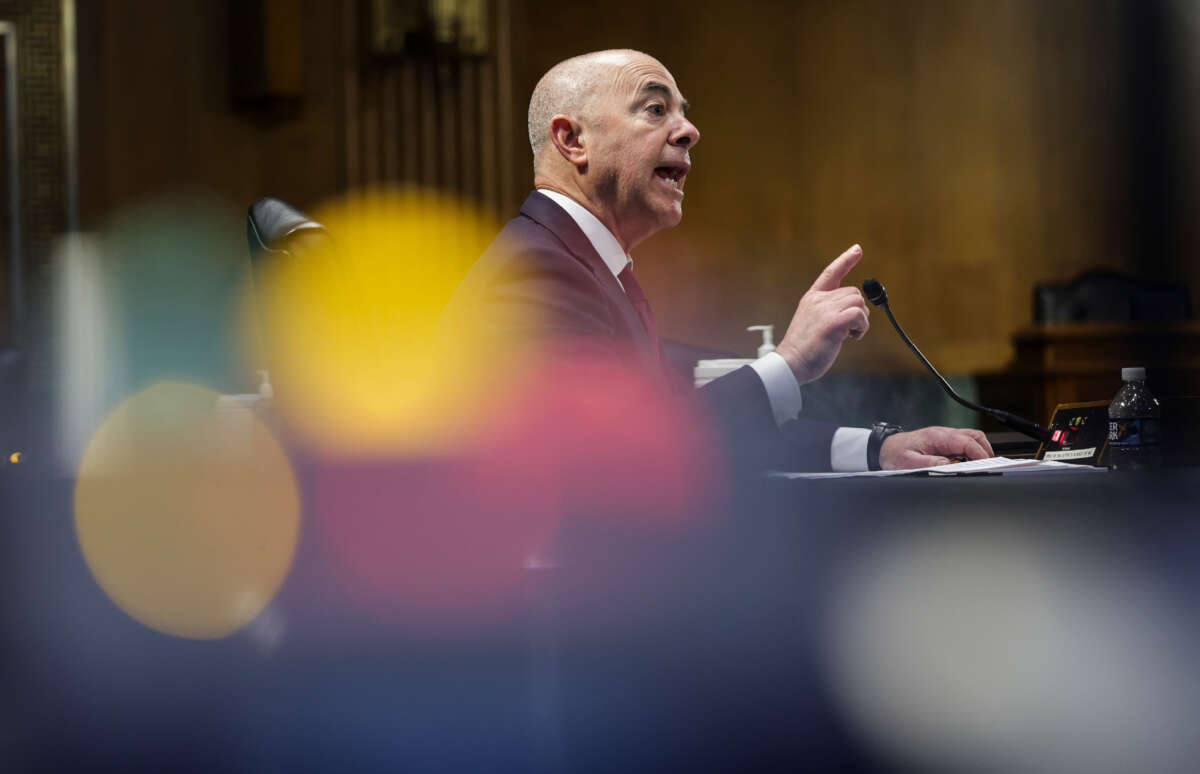Support justice-driven, accurate and transparent news — make a quick donation to Truthout today!
While welcoming parts of the Biden administration’s newly announced plans to expand refugee resettlement and family reunification parole in the Americas, migrant rights advocates on Thursday warned that provisions restricting the rights of asylum-seekers undermined the policy.
U.S. Homeland Security Secretary Alejandro Mayorkas and Secretary of State Antony Blinken on Thursday unveiled sweeping measures to address migration from Latin American and Caribbean nations to the United States ahead of next month’s termination of Title 42, a public health order invoked by the Trump and Biden administrations to deport more than 2.7 million asylum-seekers under pretext of the COVID-19 pandemic.
Title 42 is set to expire on May 11 with the end of the COVID-19 national public health emergency. Experts say as many as 10,000-13,000 migrants could arrive at the southern border each day after Title 42 ends.
The administration will open immigration processing centers throughout Latin America, while expanding access to CBP One, a U.S. Customs and Border Protection mobile app through which asylum-seekers can schedule an appointment to present themselves at a port of entry.
U.S. partners, including the United Nations High Commissioner for Refugees and the U.N.’s International Organization for Migration, will screen migrants at the processing centers to determine if they are eligible to enter the United States before they travel to the southern border.
Additionally, the Department of Homeland Security is creating a new family reunification parole process for El Salvador, Guatemala, Honduras, and Colombia.
The U.S. is also doubling the number of refugees from Western Hemisphere nations while continuing to accept up to 30,000 individuals per month from Venezuela, Nicaragua, Cuba, and Haiti as part of an expanded parole process announced earlier this year.
However, the new policy will prohibit asylum-seekers who crossed through a third country on their way to the U.S.-Mexico border, unless they had previously applied for and been denied asylum elsewhere or used CBP One to obtain an appointment at a U.S. point of entry.
“The Biden administration is rightly expanding refugee resettlement from the Americas, an overdue step towards addressing a longstanding gap for people in need of international protection,” said Eleanor Acer, senior director of refugee protection at Human Rights First.
“This initiative should swiftly bring refugees to safety and not be used to reduce the resettlement of refugees from other regions,” Acer added. “The Biden administration should focus on measures like increasing refugee resettlement and regular pathways and abandon its plan to impose an asylum ban that would be a legal, moral, and political mistake.”
The International Refugee Assistance Project (IRAP), a New York-based legal aid organization, summed up the sentiment of numerous advocacy groups, writing that while it “welcomes the expansion of family reunification parole programs and refugee processing in the Americas,” it “strongly opposes doing so as a trade-off for limiting the legal rights of people seeking asylum in the United States.”
“While today’s announcement recognizes the protection needs of people seeking asylum at the border, the administration’s simultaneous pursuit of an asylum ban and other immigration restrictions runs counter to the aim of expanding humanitarian protections,” the group added.
IRAP policy director Sunil Varghese said in a statement that “expanding family reunification parole pathways and refugee processing for displaced people in the Americas is long overdue, but we cannot ignore that the Biden administration is proposing a Faustian bargain by simultaneously seeking to implement a Trump-era asylum ban at the U.S-Mexico border, effectively slamming the door shut on countless others in need.”
“Framing USRAP as a border management tool risks further politicizing a program already at a crossroads, and should not come at the expense of asylum protections,” Varghese added. “There should be more pathways to safety for people in the Americas, not fewer.”
IRAP recommends the Biden administration expand its capacity to adjudicate asylum applications, improve the efficiency of the interview and vetting process — including by incorporating video technology — and ensure due process and transparency in refugee processing.
Katharina Obser, director of the Migrant Rights and Justice program at the Women’s Refugee Commission, an international advocacy group, said in a statement that WRC “welcomes the administration’s recognition of the need for more pathways to protection for people displaced in Latin America and the Caribbean.”
“However, WRC remains deeply concerned that these measures come at the expense of the ability to seek asylum at the U.S.-Mexico border,” she continued. “Although today’s announcement suggests more appointments will become available for people seeking asylum using the CBP One application — and WRC supports increasing capacity for asylum processing at ports of entry — the administration should also maintain the right to seek asylum without an appointment for those who cannot wait or cannot use the application.”
“Ultimately, the expansion of access to one set of protections — such as resettlement, parole, and family reunification — should not come at the expense of others, such as access to asylum at the border,” Obser added. “We had hoped to be able to express more support and optimism about the administration’s proposed plans as Title 42 finally comes to a long overdue end. Ultimately, while we welcome additional migration pathways and regional processes, we call on the administration to again reconsider its approach to asylum at the U.S. border.”
Press freedom is under attack
As Trump cracks down on political speech, independent media is increasingly necessary.
Truthout produces reporting you won’t see in the mainstream: journalism from the frontlines of global conflict, interviews with grassroots movement leaders, high-quality legal analysis and more.
Our work is possible thanks to reader support. Help Truthout catalyze change and social justice — make a tax-deductible monthly or one-time donation today.
